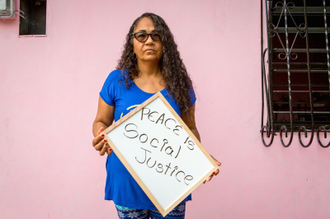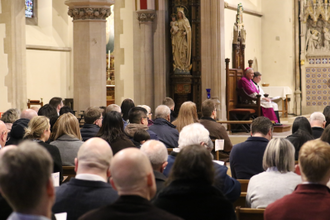Colombia marks a month of protests

Source: CAFOD
Today marks a month since social protests started across Colombia against a government new tax reform proposal, leading to police brutality in clamping down on the mostly peaceful protests, a large number of arrests, many reports of enforced disappearances, torture and sexual violence, and dozens of deaths. The reform bill was withdrawn, and two ministers have resigned. Protests have, however, continued, with young people playing a key role, despite the third deadly Covid-19 wave that is ravaging the country.
Protesters are calling for government attention to many pre-existing and underlying issues: the massive increase in poverty and inequality and a lack of access to health and education. National statistics show that twenty-one million people live in financial poverty, seven and a half million more in extreme poverty; the situation is truly critical.
And the peace process, following the peace accord signed in August 2016 with so much promise and hope, is extremely fragile: assassinations of community leaders have continued and indeed increased during the pandemic, with indigenous people and the afro-Colombian communities being disproportionately affected.
Pope Francis, on Pentecost Sunday, again called for prayers for Colombia, as talks this week entered a critical phase, praying "that the beloved Colombian people may receive the gifts of the Holy Spirit, and that through serious dialogue just solutions may be found to the many problems they are inflicted with, especially for those who suffer poverty due to the pandemic."
The Catholic Church in Colombia, along with the UN's special representative in Colombia, Carlos Ruiz Massieu, continues to play a key role in calling for and creating conditions for dialogue, accompanying the way to negotiations between protesters and the government, in whom there is a total lack of trust, a complete lack of confidence and a feeling that they are totally divorced from reality.
Mgr Hector Fabio, long-standing CAFOD partner and co-facilitator of negotiations, notes that these talks have reached a key phase for Colombia, saying that "Once the country is shown the achievements of this phase, the results that have been obtained, we hope that a different climate will start to emerge. We are seeing an explosion of many pent-up aspirations, but things will not be resolved overnight. We must bear in mind that there have been situations that go back a long way, but we are doing everything possible to achieve a climate of dialogue and a climate of understanding. We have lost a great deal our sense of humanity and Colombia has to recover its sense of humanity. In Colombia it is necessary to recover a sense of profound unity, which means recovering the recognition of the dignity of every human being. Colombia does not need polarisation. All this does is destroy our sense of humanity, our capacity to see ourselves as human beings."


















